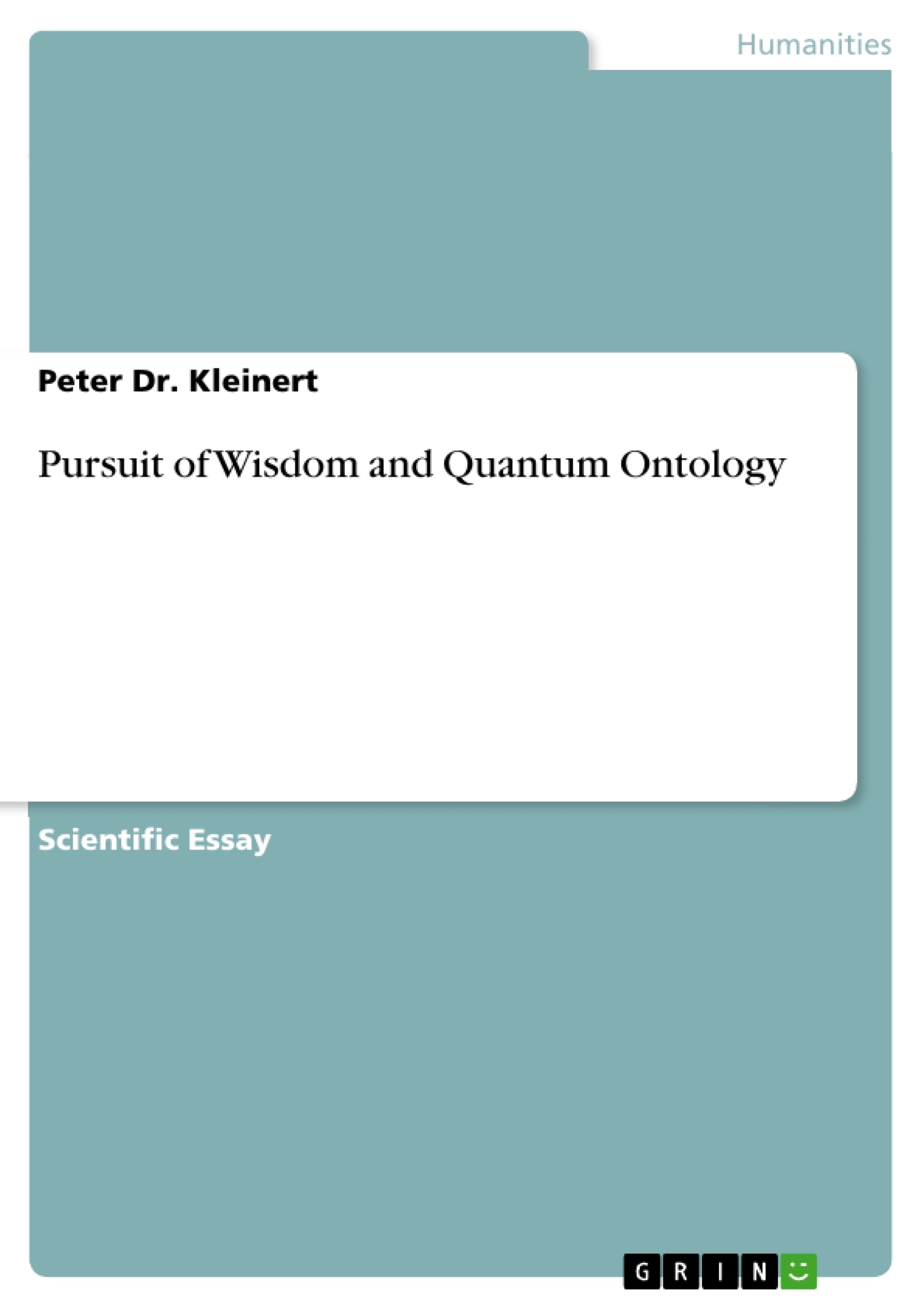In his late work (De venatione sapientiae), Cusanus unfolded basic ideas of his brilliant theology. After a long period, this ingenious teaching became clearly recognizable especially in our time. Forward with his face to the back, modern scientific theory adopts nowadays a course to which Cusanus had already pointed centuries ago. Modern thought revolves with unexpected precision and unexpected mysteriousness around two issues of his doctrine of wisdom: (i) The possibility-of-being-made is not a figment of the human brain by which it organizes one's thoughts, but a fundamental and indispensable manifestation of reality. (ii) The possibility-of-being-made refers to something antecedent by which both the feasibility and the being-made get their common shape. This ultimate ground embodies the omnipotent oneness in the form of an infinite fund in which the cause of all reality and of all possibility is timelessly stored. Comparisons with the quantum ontology and the theory of quantum gravity impose themselves.
Inhaltsverzeichnis (Table of Contents)
- I. Introduction
- II. About the possibility-of-being-made
- A. The hunting ground shown by Cusanus
- B. There is still large quarry
- III. What can we know about God?
- A. The faceless oneness
- B. A maximally unknown miraculous number
- IV. On the origin of the possibility-of-being-made
- A. Creation of feasibility
- B. Generalized quantum ontology
- V. There is no plurality of infinity
- A. Infinity and oneness
- B. About the heaven of infinities
- VI. Conclusion
- A. Consistent quantum theory
- B. The mysterious number
- C. Infinite sets
Zielsetzung und Themenschwerpunkte (Objectives and Key Themes)
This paper explores the intersection of Cusanus's theological ideas with modern scientific concepts, specifically quantum ontology. It aims to demonstrate that Cusanus's pursuit of wisdom, as outlined in his work De venatione sapientiae, can be seen as a theological perspective consistent with modern scientific understandings.
- The concept of the "possibility-of-being-made" as a fundamental aspect of reality
- The role of the "omnipotent oneness" or Creator in shaping both the feasibility and actuality of existence
- The relationship between the "possibility-of-being-made" and quantum ontology
- The nature of infinity and its relation to oneness
- The implications of Cusanus's ideas for contemporary theological and scientific understanding
Zusammenfassung der Kapitel (Chapter Summaries)
- I. Introduction: This chapter introduces Cusanus's work De venatione sapientiae and its central objective: to understand the relationship between the given and the giver, ultimately seeking to grasp the nature of God. It also outlines how the mechanistic worldview, dominant in modern science, has challenged traditional theological perspectives.
- II. About the possibility-of-being-made: This chapter examines Cusanus's fundamental principle, "Nothing will be done that cannot be done," and his argument for the ontological status of the possibility-of-being-made. He posits that the possibility-of-being-made precedes all actual existence and originates from the unchangeable eternal source, the Creator.
- III. What can we know about God?: This chapter delves into the nature of the Creator, described as a faceless oneness, and the possibility of knowing this ultimate ground. It introduces the concept of a "maximally unknown miraculous number" as a potential analog for the Creator's incomprehensibility.
- IV. On the origin of the possibility-of-being-made: This chapter explores how the possibility-of-being-made is created by God, emphasizing the inseparability of its beginning and end. It suggests a link between the concept of creation and the principles of generalized quantum ontology.
- V. There is no plurality of infinity: This chapter discusses the relationship between infinity and oneness, arguing that there is no plurality of infinities. It delves into the idea of a "heaven of infinities" as a metaphorical representation of the Creator's unboundedness.
Schlüsselwörter (Keywords)
The core concepts of this paper revolve around Cusanus's theology, the "possibility-of-being-made," the "omnipotent oneness," and their connections to modern scientific theories like quantum ontology and quantum gravity. The text explores the nature of infinity and the limitations of human understanding when grappling with these concepts. The key terms include Cusanus, wisdom, possibility-of-being-made, omnipotent oneness, quantum ontology, quantum gravity, infinite sets, and Chaitin's number.
Frequently Asked Questions
What is Cusanus's concept of the "possibility-of-being-made"?
In his work "De venatione sapientiae," Cusanus argues that the "possibility-of-being-made" is not just a mental construct but a fundamental manifestation of reality that precedes actual existence.
How does Cusanus's theology relate to modern quantum ontology?
Modern scientific theories regarding quantum gravity and ontology revolve around issue of fundamental reality that Cusanus anticipated centuries ago, particularly regarding the underlying fund of all possibilities.
What does Cusanus mean by "omnipotent oneness"?
He describes an ultimate ground or Creator that embodies an infinite fund where the cause of all reality and all possibility is stored timelessly.
What is the "maximally unknown miraculous number"?
This concept is used as an analog for the Creator's incomprehensibility, suggesting that there are limits to human knowledge when trying to grasp the ultimate ground of existence.
Does Cusanus believe in a plurality of infinities?
No, the paper discusses his view that there is no plurality of infinity; instead, infinity is fundamentally linked to the concept of oneness.
- Quote paper
- Peter Dr. Kleinert (Author), 2011, Pursuit of Wisdom and Quantum Ontology, Munich, GRIN Verlag, https://www.grin.com/document/179169



